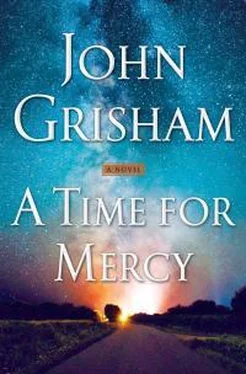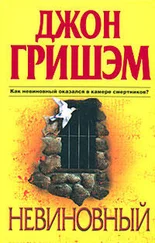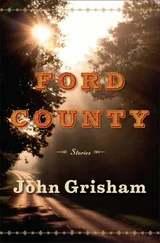Portia, being a young black woman who’d grown up on the other side of town, was not to be shut out. She told a startling story of a military murder she had worked on in the army in Germany. And that reminded Thane of a double murder somewhere in Texas in which the alleged killer was only thirteen.
By 10:30 Jake was ready for bed. He and Carla excused themselves and went home. At 2:00 a.m. he was still awake.
—
THE COURTROOM ROSE almost in unison to honor the appearance of Judge Omar Noose, who quickly waved them off and asked them to sit down. He welcomed the crowd, commented on the cooler temperature, said good morning to his jury and asked, gravely, if anyone had tried to contact any of them during the recess. All twelve jurors shook their heads. No.
Omar had presided over a thousand trials, and not once had a juror raised a hand to admit that he or she had been contacted out of court. If there was contact, it would probably involve the payment of cash, something no one would ever talk about in the first place. But Omar loved his traditions.
He explained that the next hour would probably be the dullest portion of the entire trial because, as required by law, he would instruct the jury. He would read into the record, and for the benefit of the jurors, the black letter law, the state’s statutes, that would dictate their deliberations. Their duty was to weigh the evidence and apply it to the law, and to take the law as it was written and apply it to the facts. Listen carefully. It was very important. And for their benefit, copies of the jury instructions would be available in the jury room.
When he had them thoroughly confused, Judge Noose began reading into his mike. Page after page of dry, verbose, complicated, badly written statutes that tried to define intent, murder, capital murder, murder of a law enforcement officer, premeditation, guilt, and justifiable homicide. They listened intently for about ten minutes, then began peeling off with glances around the courtroom. Some fought mightily to hang on every word. Others realized that they could read that stuff later if they wanted to.
After forty minutes Noose abruptly stopped, to the relief of everyone. He slapped his papers together, squared them up nicely, smiled at the jury as if he’d done a fine job, and said, “Now, ladies and gentlemen, both sides will be given the opportunity to make closing arguments. As always, the State goes first. Mr. Dyer.”
Lowell stood with great purpose, buttoned the top button of his light blue seersucker jacket, and walked to the jury box—the podium was optional at that point—and began. “Ladies and gentlemen of the jury, this trial is almost over and it has moved along more efficiently than expected. Judge Noose has given each side thirty minutes to summarize things for you, but thirty minutes is far too long in this case. Half an hour is not needed to convince you of what you already know. You don’t need that much time to decide that the defendant, Drew Allen Gamble, did indeed murder Stuart Kofer, an officer of the law.”
A great opening, Jake thought. Any audience, whether twelve jurors in a box or two thousand lawyers at a convention, appreciates a speaker who promises to be brief.
“Let’s talk about that murder. Tuesday morning, when we started, I asked you to ask yourselves, as you listened to the witnesses, if, at that horrible moment, did Drew Gamble have to pull the trigger? Why did he pull the trigger? Was it in self-defense? Was he protecting himself, his sister, his mother? No, ladies and gentlemen, it was not in self-defense. It was not justifiable. It was nothing but cold, calculated murder.
“Now, the defense has had a field day slandering the reputation of Stuart Kofer.”
Jake jumped to his feet, raised both hands, and interrupted with, “Objection, Your Honor. Objection. I hate to disrupt a closing argument, Your Honor, but the use of the word ‘slander’ means the spreading of falsehoods. False testimony. And there is absolutely nothing in the record to even remotely indicate that any of the witnesses, for the State or for the defense, has lied.”
Noose seemed ready for the interruption. “Mr. Dyer, I ask you to refrain from using the word ‘slander.’ And the jury will disregard the use of that word.”
Dyer frowned and nodded, as if he was being forced to accept the ruling but didn’t agree with it. “Very well, Your Honor,” he replied.
“Now, you’ve heard a lot from the three Gambles about what a terrible person Stuart Kofer was, and I won’t rehash any of it. Just keep in mind that they, the Gambles, have every reason, every motive to tell only one side of the story, and to perhaps embellish and exaggerate here and there. Tragically, Stuart is not here to defend himself.
“So let’s not talk about the way he lived. You’re not here to judge him or his lifestyle, his habits, his problems, his demons. Your job is to weigh the facts regarding the way he died.”
Dyer stepped to the exhibit table and picked up the gun. He held it and faced the jury. “At some point during that terrible night, Drew Gamble took this gun, a Glock 22, forty caliber, fifteen in the magazine, issued by Sheriff Ozzie Walls to all of his deputies, and he held it and carried it around the house. At that moment, Stuart was sound asleep on his bed. He was drunk, as we know, but the alcohol had rendered him helpless. A blacked-out drunk, snoring away, not a threat to anyone. Drew Gamble held the gun and he knew how to use it because Stuart had taught him how to load it, hold it, aim it, and fire it. It’s rather ironic, and tragic, that the killer was taught to use the murder weapon by the victim himself.
“I’m sure it was a terrible scene. Two frightened kids, their mother unconscious on the floor. Minutes passed and Drew Gamble had the gun. Stuart was asleep, in another world. An emergency call had been made, the police and rescue personnel were on the way.
“And at some point, Drew Gamble made the decision to kill Stuart Kofer. He walked to the bedroom, closed the door for some reason, and he took the gun and placed the barrel an inch or two from Stuart’s left temple. Why did he pull the trigger? He claims he felt threatened, that Stuart might get up and harm them, and he had to protect himself and his sister. He wants you to believe that he had to pull the trigger.”
Dyer slowly returned to the exhibit table and laid down the gun.
“But why then? Why not wait a moment, or two? Why not wait to see if Stuart was getting up? Drew had the gun. He was armed and ready to defend himself and his sister in the event Stuart somehow managed to revive himself and come after them. Why not wait until the police arrived? Why not wait?”
Dyer stood squarely before the jurors and looked at each one of them. “At that moment, he did not have to pull the trigger, ladies and gentlemen. But he did. And he did so because he wanted to kill Stuart Kofer. He wanted revenge for what happened to his mother. He wanted revenge for all the terrible things Stuart did to them. And revenge means premeditation, and that means the deliberate act to kill.
“Ladies and gentlemen, premeditation equals capital murder. Enough said. I urge you to retire for your deliberations and return a just and true verdict. The only verdict that fits this crime. A verdict of guilty for the capital murder of Stuart Kofer. Thank you.”
It was a fine closing. Well planned, to the point, persuasive, and concise, something rare for a prosecutor in a big case. Not a single juror was bored. Indeed, each one seemed to follow every word.
“Mr. Brigance.”
Jake stood and tossed his legal pad on the podium. He smiled at the jurors and looked at each one of them. About half watched him, the rest stared straight ahead. He began with “I don’t blame the State for asking you to downplay much of what you’ve heard. It certainly isn’t pleasant to talk about abuse, and rape, and domestic violence. They are ugly topics, awful things to discuss anywhere, especially in a courtroom with so many people listening. But I didn’t create the facts, nor did you, nor did anyone but Stuart Kofer.
Читать дальше












![Джон Гришэм - Апелляция [Фейк]](/books/403002/dzhon-grishem-apellyaciya-fejk-thumb.webp)